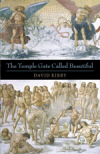The Temple Gate Called Beautiful
David Kirby is the rare poet who juxtaposes humor and satire with a serious academic and classical knowledge without pandering exclusively to one or the other. It is a balancing act that is quite successful because it appears effortless. Mr. Kirby has a niche and a style that does not vary stylistically from collection to collection, a consistency that is not a weakness but a strength. If you desired, you could group David Kirby’s witty poems with the likes of Tony Hoagland, Dean Young and Bob Hicok. Kirby is a specialist, strumming his voice, his lone unique instrument, like a speed-reading comedian who makes the reader read until they are out of breath but rarely dissatisfied. In his new collection, this exploration of humor through knowledge and vice versa is gladly continued.
In “Elvis, Be My Psychopomp,” he sees his dead parents in a ticket line and at the supermarket and tries to communicate with them in one of the many mini-epics that populate this collection: “they vanish, Like the gods in The Iliad. / They’re my age now—or not my age, for if they are sixty, / then I am twenty again, so young and unhappy, / though I don’t know it.” Throughout, Kirby makes reference to classical epic narratives of fathers, mothers and their sons, using these known relationships to inform his own relationship with his parents.
The issue of aging, mortality and what lies beyond it is one of the central themes in Kirby’s poems. In “The Only Good Question,” the erosion of appearance is addressed.
“And then your looks leave,” she says,
and I can see them headed out the swinging door:
your taut skin, your high fanny, your shiny eyes and hair,
and I ask myself, Where do they go,
your looks, which sounds like a good question,
and certainly it’s the kind of question I would ask
if I were writing the poem ten years ago,
but it isn’t—now there’s only one good question,
and that’s “What the fuck?”
I mean your looks do leave but then
so does everything else.
This poem’s whimsical tone of voice takes the subject of aging and makes it a humorous yet unfair conundrum that can be questioned with exasperation and zeal but cannot truly be rectified. In this poem, Kirby further explores all the unique hardships the advancing years can bring, such as living while your friends all pass away or taking care of a loved one with Parkinson’s Disease.
In the title poem, “The Temple Gate Called Beautiful,” our notions of heaven and hell are deconstructed William Blake style, laying bare their inherent absurdities and contradictions. This poem centers around outsider artist W.C. Rice’s house in Prattville, a character the author uses as a conduit or device to explain who goes to heaven and who goes to hell in this society and what does it mean if anything.
When some audience members
booed a drunk Jerry Lee Lewis one time,
he gestured toward the back of the hall
and said, “Them doors swing both ways.”
Not here on Highway 86 near Pratville, though,
not on Mr. Rice’s property. Doors only go one way here;
you’re either safe or out on Mr. Rice’s
diamond. You’re kosher or treyf. It’s Heaven or Hell for you,
not to put too fine a point on it, and usually Hell.
But as the smart-alecks say, if you go to hell
for doing Satan’s work up here, why would
he punish you when you got to his place?
At his best, Kirby used a comedic and philosophical style of poetry to deliver what elsewhere poetry lacks. He is a poet who peels away the layers of our skin to show us who we are: our weaknesses, our strengths and our hilarious obsessions. In this collection, Kirby is a student of language and how we misuse it to serve our own ends. These mini-epic poems demonstrate a mastery of the turn of phrase, leading us onward toward Kirby’s inevitably laugh-filled punch lines, little bits of heaven left behind for us to contemplate in the here and now.





